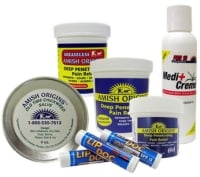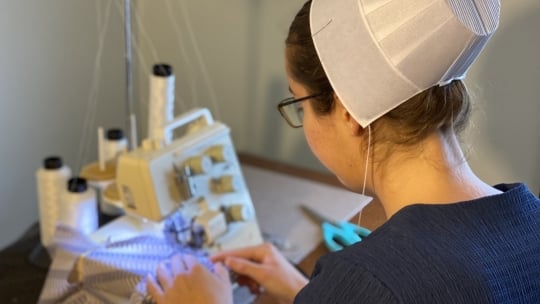Should we really beware the Amish-made label?
There’s been a good bit of media this week on the use of the Amish name to sell things. If you recall we’ve visited this question on a number of occasions, most recently in “Is it wrong to sell using the Amish name?”
One story in the Pittsburgh-Post Gazette gives us an example of the potency of the Amish tag:
In 2010, Unker’s, a homeopathic pain relief ointment company based in Worland, Wyo., was looking for a new name after it lost a trademark dispute. Founder Jerry Doerr chose to rechristen his product “Amish Origins,” complete with a logo of a horse and buggy. Mr. Doerr’s company has no direct connection to the Amish, but he claims the ointment was originally developed by an Amish man.
As a result of the name change, said Mr. Doerr, “We have almost gone viral. Our Internet orders have tripled since we started using the Amish name.”

Is it ethical to execute a naming 180° like this?
In my view, if it’s true that an Amish man really came up with the original recipe, “Amish Origins” seems pretty accurate and it would be hard for me to fault Mr. Doerr. Either way, it sounds like losing was winning in the case of Unker’s/Amish Origins.
There are more suspect examples out there. From a blog comment by Greg Miller:
There is an ongoing question with the “Amish Market” here in New York City. I can find no evidence that this is in any way connected with the Amish despite their attempts to link to Amish. As far as anyone I’ve ever spoken to this is one of those situations of trying to cash in on the name and lifestyle. If anyone knows any differently, please let me know. It is some sort of local joke that they are “Amish.” I think it’s horrid.
I’ve never been there, but have heard similar descriptions of this Manhattan outlet, and you can find more such skepticism on yelp.com.
I’ve also heard of people being told that the local Amish are so public-wary that they only do business via an exclusive dealer. In some cases this may be accurate, but it’s important to remember that even very conservative Amish sell things directly to the public from their homes. However it is true that some are more comfortable doing so via a third party–rather than inviting outsiders onto their property or having to deal with retail headaches.
Here be Amish-made
ABC News also ran a short piece–“Beware the Amish-Made Label“–with a quote from this blog, of an Amishman who warned about the “Amish Country” loophole we’ve discussed here before. I don’t know that we necessarily need to beware the Amish-made label, though. There are many businesses that use the word Amish in their names which sell legitimately Amish-made products.
This is common with furniture. For example, about half of the 30-some non-Amish retailers I’ve listed in the guide for New York Amish furniture use the word “Amish” in the names of their businesses. And some of those that don’t may only sell a small amount of Amish furniture among an array of English manufacturers.
In the Pittsburgh Post-Gazette piece I’m quoted saying that “The Amish are aware of how their products are being marketed and aware of the appeal”….”They benefit from that.” What I meant is that Amish manufacturers know that the English people they contract with to sell their goods are not hiding their Amish pedigree under a rock. These retailers amplify the reach of Amish products and have played a key role in helping the Amish achieve success. I think it’s important to recognize that while being mindful of the bad apples and grey areas–assuming Amish origins are as important to us as they’re made out to be.
I think Brad Igou makes a good point in the ABC news piece, saying that people should “do their homework”. That’s a good rule of thumb. If a guy with a beard, suspenders and last name Yoder takes your money in a dimly lit shop with a bunch of barefoot kiddos running around, you’re probably on the right track. The further we separate ourselves from that scenario, the more diligent we have to be if we want to make sure what we’re buying really came from Amish hands.








Erik, regarding Unker’s Medicated Salve or Skinner’s Vaporizing Salve, I question the use of the word “homeopathic.” It is somewhat a home remedy.
Quaker labels
The same issue was relevant for Quakers over a century ago. Quakers were known for their honesty in business dealings, thus Quaker Oats and Quaker State Oil, neither of which had anything to do with Quakerism (that I know of). Many years later, Quakers have fallen into relative obscurity (in part perhaps a result of abandoning plain dress), but the labels have stuck around.
Quaker Oats I believe was a direct effort to capitalize on the Quaker image.
Quaker State Oil, however, I think more comes from the nickname of Pennsylvania as the “Quaker State” and earlier “Quaker Province” since William Penn was a Quaker, and ensured the charter included a liberty of conscious (religion) clause. The name came into being when a number of oil companies in Oil City, PA merged around 1900.
I could be wrong, but at least the business folk back then had plausible deniability about why they chose the name 😉
Best thing to do is go straight to the horse’s mouth. Buy it directly from an Amish maker. You eliminate the middleman, and by doing so it saves you money and helps the producer. It’s a little more trouble, but probably worth it in the long run. Do a Ebay search for “Amish Quilt”; you’ll find about a bazillion hits, of which at best half are actually Amish made. The rest are Amish inspired” or “Almost Amish” or “Amish style” or somesuch verbage intended into misleading the unwary.
I agree, Forest. I imagine that the majority of American consumers have a healthy skepticism when they make their purchases. We’re all accustomed to “knock offs” and realize that we take a risk when we buy anything that makes a claim of one sort or another. Sure, there will always be those who end up feeling like they were misled or taken advantage of, but I believe that those people either “never learn,” or learn a valuable lifelong lesson: consumer beware.
It probably benefits the Amish. It publicizes that Amish products are so good, every manufacturer wishes they could do it “their way.” Savvy consumers will drive out to Amish County to purchase the “real deal.”
Amish “COUNTRY.” …I’ve been making lots of typos lately. Wish I knew how to edit.
I keep asking Erik to give us an EDIT BUTTON…..don’t know what he’s waiting on…..hey Erik, did you hear this ???? 🙂
GIVE US AN EDIT BUTTON PLEASE 🙂
Kentucky Lady 717, if you have time, you could compose a comment in your email, then spell-check it, then copy and paste it to leave a reply at Amish America. But that wouldn’t help everything because “county” and “country” are both spelled correctly.
I agree with Forest…I recently did an “Amish” search on Ebay and saw a very similar quilt to one I own made by a Not Amish lady.
I did end up ordering my husband a work belt that said Amish made and came from Sugar Creek Ohio. Was it truly Amish made? We don’t know but judging from the looks of it it is very high quality. I just hope it lasts him longer than the Walmart {Dickies} kind that wore out within weeks. Dickies company said not their problem…which figures…ha!
” If a guy with a beard, suspenders and last name Yoder takes your money in a dimly lit shop with a bunch of barefoot kiddos running around, you’re probably on the right track.”
Love it!
Even in some of the Amish stores, I have been to, they sell non Amish made items. Like the wood block train whistle that I would assume the Amish could easily make, but the lable listed it’s origin as China.
Maybe I am just being dumb about buying things that are made by the Amish, as many English made items can hold up just as well. I just like the idea that I have something made by the Amish.
And if a short, barefoot green guy named Yoda takes your money in a dimly lit shop in a swamp…well, you’re in a galaxy far, far away in a time long, long ago.
Well done Matt 🙂 “Yoda” is just the New Yawk pronunciation of Yoder though 😉
Wondering why my comment did not make the cut?
Tammy for some reason your comment got caught by the blog’s moderation feature…I have been offline for the past 3 days and just approved it, you should see it above. Sorry about that.
What's in a name?
I find it both interesting and frustrating that some people use “Amish” to sell their (non-Amish-made) goods, knowing that the name “sells” just about anything it’s attached to.
However, from all I’ve read & learned about the Amish, they themselves would not bring a lawsuit against anyone doing just that (non-Amish benefitting from the “Amish” name).
Do YOU (Erik or anyone else) know if Amish have ever done such a thing? Has anyone (in the “English” community) sued the “non-Amish” for misrepresenting themselves or their goods as being Amish/Amish-made when that’s not true?
I sure wish I had more time to read more here. (Working for a living can make one ignorant!)
Alice Mary
Great question Alice Mary, sorry I’m just catching up with everything now (visited the NC beach and had a long weekend). I’ve never heard of any lawsuit of the sort and wouldn’t expect too…something like this coming from Amish would be highly frowned upon to say the least.
I try and buy the best quality items regardless if its Amish made or not to be honest, and I truly think that most anything that’s American made is usually superior to anything made in Asia. They said years ago that we (America) was going to get away from actually making anything here anymore, that we didn’t need to have a manufacturing base and that we were going towards being strictly a services orientated country. Who ever came up with that one “man are they so very wrong” in my book. Richard from http://www.Amishstories.net
You are so right Richard….that is what’s wrong with this country right now…..everyone buys everything from china, mexico, and all the other countries who make this crap and sells it to us…..when I shop, I always look to see where it is made and or produced and if it is from one of these countries, I put it back on the shelf…..we need to buy AMERICAN and keep the jobs here…..
I buy and sell Amish products. I buy from the Amish that I live by and they know my purchases are for resale, I buy in bulk, for example 10-20 quilts at a time or several pieces of furniture in order to receive better pricing. I actually receive the same rates as a larger retailer because I have taken the time to get to know the Amish I purchase from. All products I sell are 100 percent Amish but I do not include the term Amish in the name of my business or any other term that relates to the Amish. I do however advertise 100 percent Amish made products, because they are made by the Amish. The Amish I work with enjoy the arraignments and I benefit also. I deal with the world and they do not have to have constant interaction with the outside world.
Self correction, It should be arrangement not arraignments
Tom, the edit button would have come in handy here too eh 🙂 Let’s keep asking Erik to give us an EDIT BUTTON…..:) and he just might……
I don't mind the errors
Take my errors as sign of my own imperfection, I don’t mind, and hopefully will make you giggle in realizing we’re all human and make mistakes. Maybe my booboos make you feel better about your booboos 🙂
(Did i really just say that on a public forum?)
Amish labels on wine
In Holmes County OH there are some wineries. And one of them was approached by an Amish Bishop, from what I heard, to change their sign on the road as it gave the impression that this was an Amish winery. So now the sign reads “Amish Country Wines”. But they do like to put horse & buggy on some of their labels-(admittedly, I bought some!) The Amish do make their own wine for communion and possibly do not abstain in addition to communion, I can’t say for sure what their ordinance is on the matter-but one thing-they did not want the public believing this winery was Amish!
I’ve always found the “amish” potato salad that is sold at walmart to be amusing…
Sarah – In my area (southeastern PA), Amish potato salad is a type and flavoring of potato salad, just as German Potato Salad is a distinctive type and flavoring. Most of our grocery stores have several “versions” of potato salad — plain, German, Amish,red potato, etc. And the Amish potato salad recipes are very similar from store to store. I don’t think of it as “using the Amish name to sell”, but rather as a way to identify the type and flavor you are purchasing (and original recipe source).
Just how I’ve always viewed it.
I have friends at my conservative Mennonite church (here in Alberta, hundreds of miles from any Amish) who own a store called Classic Furnishings, which sells the “Simply Amish” brand of furniture. They tell me that they often get customers who come in and want to know if they are the “real thing.” The furniture that they sell is Amish-made, but they know the implications of using the name as a selling feature and they don’t seem to mind.
Amish made in China
I took my youngest son with me to an Amish owned and operated store last year for Christmas. He wanted to buy his mom an Amish wooden rolling pin to do her baking with. When she opened it on Christmas she found a made in China tag. We were disgusted. The reason we went to Amish Country was to buy Made in USA by Amish goods. I never thought about checking for a tag. If you cannot trust the Amish … who can you trust. That is a lesson my son and I learned last year. I would expect an Amish clock, or similar item, to have components made elsewhere, but not wooden items. Very sad and disappointing.